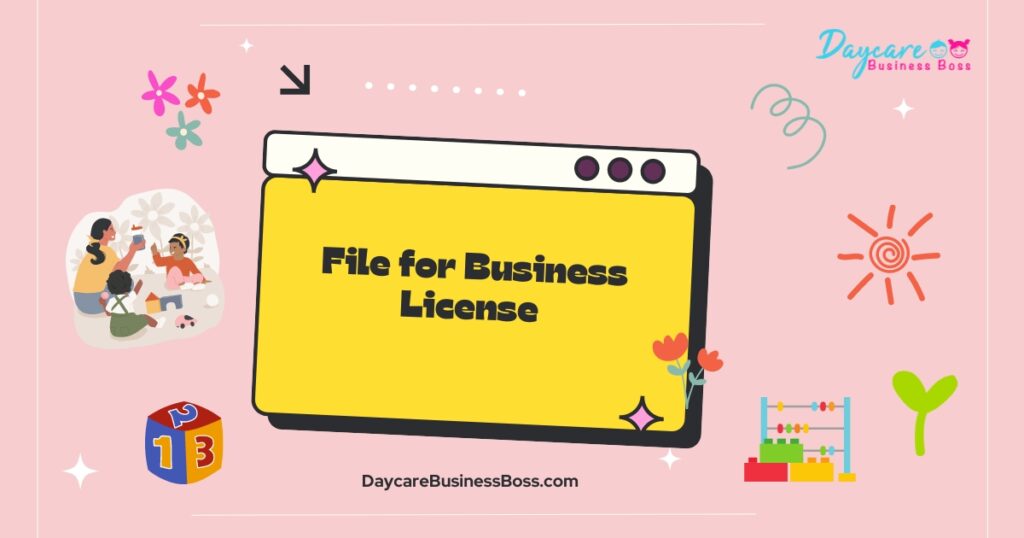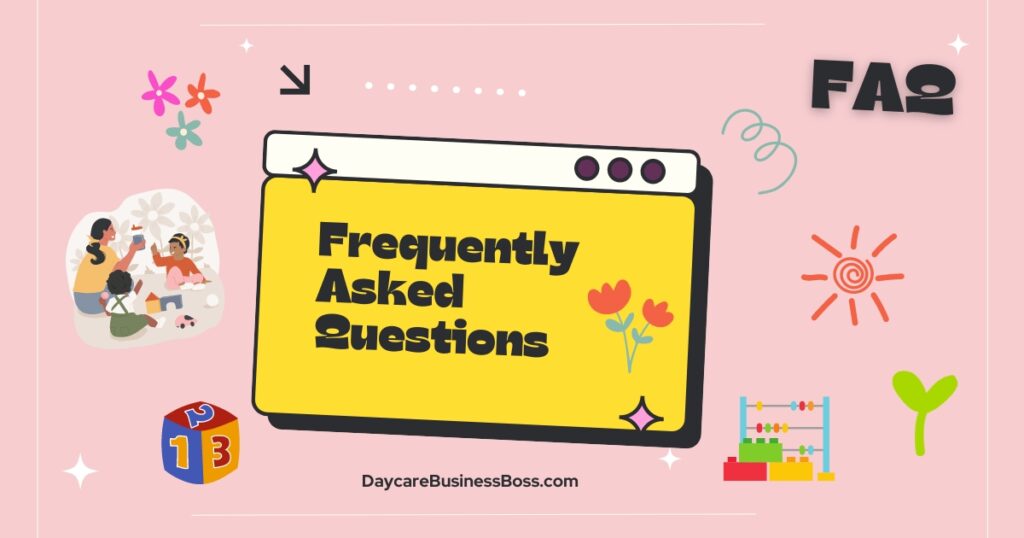Florida has more extensive licensing requirements with regards to opening a daycare than most states. You must take the proper steps to ensure your daycare business is legal. It will help you succeed and ultimately gain the trust of potential customers in your community.
Here are the steps for how to open a daycare in Florida:
-
Sign up for training with the Florida Department of Children and Family Services
Determine daycare location
File for a business license
Apply for EIN with IRS
Research county and city requirements
Apply for a daycare license
Market to target audience
You’ll find all the guidance needed to open a daycare business in Florida right here. Whether you’re just getting started or you’ve been working on this plan for a while, we can help. Read on for more info about how to open a daycare in Florida. Make sure to check out the bonus section on how to set your daycare business apart from the competition, too.
Step 1: Sign Up for Training with Florida Department of Children and Family Services
Florida has more guidelines for childcare providers than many other states. For instance, childcare workers in Florida are required to take a 40-hour certification training class and pass an exam upon completion. You can take the course while working in the field. However, it must be completed within one year.
The Florida Department of Children and Family Services sets and oversees requirements for daycare centers. You’ll sign up for your training through their website.
Childcare providers must also complete a minimum of 10 hours of on-the-job training yearly. It ensures employees stay up to date on current standards and guidelines that can change from year to year.
While there’s no requirement for daycare owners to have a college degree, it may serve you well to have one in something relating to child development or education. Anything working in your favor to instill confidence in parents soliciting childcare services is worth it. College degrees go a long way toward building trust in professionals. Especially professionals who care for our children.
Other useful classes include business management, accounting, and marketing.
You and your employees should obtain first aid and CPR certifications, as well. Emergencies do arise in daycare settings. Sometimes every second count. Educated childcare workers are better prepared to handle any situation.
Step 2: Determine Daycare Location
You must choose a daycare location, meaning a freestanding building, suite in a commercial building, or your private residence. What kind of facility are you opening? You need a building to house your business. There are three types:
-
- Leased space – Find a building or suite to rent. Determine if the cost structure is best for your financial situation.
- Purchased space – Find a building or suite to buy. Commercial daycare facilities must have at least 20 square feet of floor space inside per child. Additionally, there must be 45 square feet of ground space outside per child with a fence around the area.
- In-home – Many of the same guidelines will apply. In-home daycares have a separate application with the state. Make sure you submit the proper form.
Step 3: File for Business License

You must obtain a business license for your daycare. Decide what legal structure you want first. Choices include sole proprietorship, partnership, limited partnership, and a corporation. Each has separate guidelines.
Here are brief definitions of the legal status options:
-
- Sole proprietorship – You are your business. You own it by yourself. Your finances are co-mingled with the finances of the business. Taxes are filed together.
- Partnership – The partners are the business. Both parties contribute money, labor, and other efforts. Both benefit from the profits. Both are responsible for debts. This is, essentially, a dual-status sole proprietorship.
- Limited partnership – The business structure provides some protection to the owners from losses and legal action brought against the business. Personal finances are kept separate from business assets. One partner has more control, most of the time.
- Corporation – The daycare is its entity. The owner is protected from legal action. Personal assets are not tied up in the business. You must file “Articles of Incorporation” with your state.
Be mindful of the time it will take for you to receive your business license. Look for requests from the state for additional information and respond to those quickly. Processing times vary throughout the year, so stay engaged in the process.
Learn more about getting a business license HERE.
Step 4: Apply for EIN with IRS
You must obtain an EIN from the IRS unless you choose to structure the daycare as a sole proprietorship or regular partnership. The EIN acts as a social security number for a business. It allows the government to track taxes owed from businesses operating across the country.
The process is simple. Go to the IRS website. Click “Apply Online Now” to pull up the application. Fill in all the required information. It must be completed in one sitting. You will not be able to save your application for completion later. The system automatically logs you out after 15 minutes of inactivity. Click “Submit” as soon as you’re finished.
Once your application has been validated, you’ll receive an EIN confirmation notice via email. Save the page for your records.
Step 5: Research County and City Requirements
The county and/or city you’re operating in may have additional requirements. Look up regulations on their respective websites. Follow all the steps indicated for both your county and city.
Requirements vary for different locations across Florida. It’s important to check all regulations and laws for your specific location.
Step 6: Apply for Daycare License
The Florida Department of Children and Families requires daycares to obtain daycare licenses as well. The application is on their website. It consists of three pages which must be completed in their entirety. There is a fee associated with this application.
If approved, you will receive a daycare license number. Sometimes, an issue will arise with your application. The agency may reach out to you for more information. The quicker you respond, the faster you’ll receive your license.
If a problem arises with your application and you are not approved, contact the Florida Department of Children and Families to speak to someone about the issue. Address the problem so your application can then be re-evaluated.
Keep in mind that obtaining all the proper credentials can take up to 90 days. Stay on top of this process to keep things flowing in the right direction. The more engaged you are with the process, the faster it will go.
Step 7: Market to Target Audience
Marketing for your daycare business should start as soon as you know you’re opening one. You’ll need an enrollment form to offer. The Florida Department of Children and Families has one available on their resources webpage.
Establish an online presence. Hire an expert to build your daycare website. Include all information parents will look for online. Make the information easy to find. Include hours, location, phone number, pricing, schedule, and daily structure. Social media pages should be linked here, also.
Schedule an open house for parents to visit your daycare center. Encourage them to bring their children with them. Make sure to have some takeaway items for additional advertisement opportunities.
Marketing isn’t just about television commercials or printed advertisements. It’s about getting the word out to potential customers. Offer referral programs, repeat customer benefits, or discounts for multi-child families. Build your reputation through community outreach programs, too.
Bonus Section: How to Set Your Daycare Apart
Put some effort into standing out from your competition. Start by getting to know your competition. How many and what types of daycare centers are in your area? How much availability is there within those daycares? What are their hours? What are they offering in terms of education for children?
Once you know what you’re up against, you’ll know how to set your daycare apart from the competition. Here are some ways to do that.
-
- Obtain the Gold Seal Quality Care Accreditation
- Offer language studies curriculum for appropriately aged children
- Allow for early drop-off and late pick-up times
- Begin each family relationship with a two-sided interview—you ask questions, they ask questions
- Display a well-thought Code of Conduct in-house and on the website
- Create clearly defined spaces within the daycare for the enrichment of senses and development of skills
- Offer unique learning opportunities, such as gardening, nutrition, or raising chickens
This is not an exhaustive list. Use your imagination to find your ways of standing out. Anything that adds value for parents can earn you more customers.
Conclusion
You know how to open a daycare in Florida now. It’s time to put the knowledge gained to work. Follow the steps in this guide to obtain all the credentials required by the state, county, and city where you’re located. Make sure you and your employees sign up for the necessary training sessions. Get your tax ID from the government, if applicable. Then you can work to enroll the number of children you are approved to care for and be on your way to building a thriving, successful daycare business.
Some Related Questions:

How much does it cost to open a daycare in Florida?
You need between $10,000 and $50,000 to start a daycare in Florida. In-home daycares won’t require the same amount of money. The legal structure you choose could affect the cost of opening your daycare. Those who choose to open a franchised daycare will likely need a larger sum of money.
How much do you make owning a daycare?
Daycare owners make varying amounts of money. The average is around $37,000. A good range to use as a guideline is from $20,000 to $60,000. The size, location, and demand for childcare services will determine how much money daycare owners make.
What is the ratio for daycare in Florida?
A licensed childcare center in Florida must adhere to the following ratios:
-
- Under 12 months – 1 to 4
- 12 to 23 months – 1 to 6
- 24 to 35 months – 1 to 11
- 36 to 47 months – 1 to 15
- 48 to 59 months – 1 to 20
- 60 months and above – 1 to 25
Please note: This blog post is for educational purposes only and does not constitute legal advice. Please consult a legal expert to address your specific needs.
To learn more on how to start your own daycare checkout my startup course and documents here.

Meet Shawn Chun: Entrepreneur and Childcare Business Fan.
I’m a happy individual who happens to be an entrepreneur. I have owned several types of businesses in my life from a coffee shop to an import and export business to an online review business plus a few more and now I create online daycare business resources for those interested in starting new ventures. It’s demanding work but I love it. I do it for those passionate about their business and their goals. That’s why when I meet a childcare business owner, I see myself. I know how hard the struggle is to retain clients, find good employees and keep the business growing all while trying to stay competitive.
That’s why I created Daycare Business Boss: I want to help childcare business owners like you build a thriving business that brings you endless joy and supports your ideal lifestyle.

